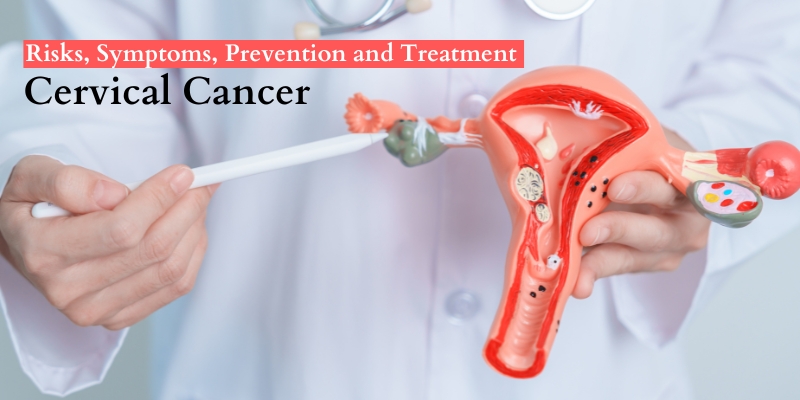



Everybody is talking about cervical cancer. Are you aware of cervical cancer? Nowadays, Cervical cancer is a subject of concern for everyone.
In India, the second most common cancer among women is cervical cancer. According to surveys and research, one woman dies due to cervical cancer every eight minutes.
Females are affected by this deadly cancer, which will kill them if nothing is done to cure it right away.
Let’s learn more about Cervical Cancer
how to prevent the risk from it and diagnose it before it causes death.A cancer that starts in the cells of the cervix is Cervical Cancer. The cervix is the lower and narrow end of the uterus(womb) that connects to the vagina(birth canal).
Usually, cervical cancer develops slowly over time. Before cervical cancer develops, dysplasia—a condition in which abnormal cells start to increase in the cervical tissue—occurs in the cervix's cells.
The abnormal cells may eventually develop into cancer cells and grow and at last spread more into the cervix and its surrounding tissues if they are not removed or eliminated.
Additionally, a persistent infection with high-risk strains of the sexually transmitted virus HIV is the primary cause of most cervical cancers. Cervical cancer is not always the result of HPV infection, and other factors may also play a role in its development.
Cervical cancer poses a life-threatening risk to Indian women. Cervical cancer can often be prevented or diagnosed in its early stages with routine tests.
There are various risk factors which are related to Cervical Cancer.
1. HPV infection: The risk is increased by being infected with several HPV strains, especially HPV-16 and HPV-18.
2. Rarely screening: women who do not get routine HPV or Pap tests are more likely to have cervical problems that go undiagnosed, which increases the risk of cancer.
3. Smoking: Research has indicated a connection between tobacco use and an increased risk of cervical cancer.
4. Weakened Immune System: Those who have HIV/AIDS or other immune system disorders are more vulnerable to HPV infections and might be at a higher risk of developing cervical cancer.
5. Early Sexual Activity: There is a higher chance of HPV infection when sexual activity is done before a certain age.
1. Vaginal bleeding after menopause
2. Pelvic pain
3. Pain and bleeding after intercourse
4. Abnormal vaginal bleeding, such as between periods
5. Vaginal discharge with a foul odor.
1. The most common high-risk HPV strains are protected against by vaccines like Cervarix and Gardasil. Before engaging in sexual activity, teenagers and young adults should get vaccinated - HPV Vaccination.
2. Precancerous abnormalities in the cervix can be identified early by routine Pap and HPV tests, allowing immediate action - Regular Examination.
3. Reducing the number of sexual partners and using condoms consistently are two safe sex practices that can lower the risk of HPV infection - Safe Sexual Practices.
4. Quitting smoking will reduce your risk of developing cervical cancer and other smoking-related illnesses - Stopping Smoking.
5. Having a balanced diet, exercising frequently, and controlling stress will boost immunity systems overall and reduce the chance of cancer - Healthy Lifestyle.
1. Surgery is one of the ways to remove cancerous tissue, surgeons can perform hysterectomy, cone biopsy, or lymphadenectomy surgeries.
2. Radiation therapy is used to target and destroy Cancer cells with high-energy radiation.
3. Chemotherapy is a therapy in which medicines are used to either eliminate or reduce the growth of cancer cells.
4. In certain circumstances, the therapy that targets particular abnormalities within cancer cells can be used.
Women who have cervical cancer face emotional and mental challenges in addition to physical ones. It is a preventable and treatable disease, especially when detected early through regular screening.
By understanding the risks, adopting healthy lifestyle practices, and seeking timely medical care, women can take proactive steps to protect their cervical health.
We recognize the emotional and social aspects of gynecologic problems and provide the best medical care with necessary support and the best gynecology services in Kusum Dhirajlal Hospital.
We have a highly experienced, interdisciplinary treatment team, composed of the best gynecologic oncologists and specialized gynecologic nurses who are always available to benefit the patients by intervening and providing the best medical care to women during Cervical cancer.